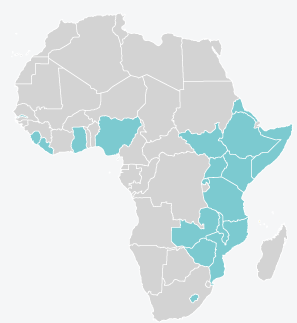
The Regional Hubs are a key knowledge exchange and knowledge brokering mechanism for KIX. Since March 2020, the hubs have been steadily setting up their operations, identifying their regional agenda, contributing to the development of KIX’ latest funding opportunity and adapting their work to accommodate the current COVID-19 pandemic. In this news item, we provide an update on the progress and priorities of the KIX Africa 19 hub.
Latest activities
The KIX Africa 19 hub has now established hub activities in 18 out of 19 GPE member countries across Southern, Eastern and West Africa. To understand the education priorities of those countries, the hub conducted a rapid country assessment which consisted of:
-
a rapid assessment survey shared with education stakeholders to establish baselines and hub priorities
-
An analysis of results in order to share with hub members
-
The development of a report based on the results of the assessment.
Since March 2020, the Africa 19 hub has hosted 3 virtual inception meetings
-
Virtual inception meeting May 5, 2020: Introduction of the hub, objectives and thematic areas to DCPs and partners
-
Virtual meeting May 21, 2020: Presentation of the results of the rapid assessment on Learning Assessment, Teaching and Learning, Equity and Inclusion and Data;
-
Virtual meeting June 11, 2020: Presentation of the results of the rapid assessment on Learning Assessment, Early Childhood Education and Gender Equality and preview of the In-depth Country Assessment.
Summary of key regional priorities
To identify the priorities of the GPE-member countries that the hub oversees, the Africa 19 hub began a process in March 2020 to identify shared policy challenges for public education systems. The process has involved consultations with government and non-governmental education stakeholders from the countries, regional experts, and a review of education sector plans and regional education analyses. A full report on the priority identification process can be found here.
The hub conducted a rapid assessment using a questionnaire to collect quick data with a view of identifying experiences, best practices and innovations as well as emerging priorities and institutional capacity development needs on education section policy formulation and development along the six thematic areas and beyond. The assessment also aimed at identifying what is working and what is not working as well as other emerging issues; types of knowledge and innovations in the education sector in evidence-based policy development and implementation along the six thematic areas. This was then followed by discussions with the country KIX focal points on the findings and the following two themes have been highlighted as priorities:
1. Teaching and Learning
2. Learning Assessment
3. Gender equality
The results from the rapid assessments also highlighted several gaps:
-
Innovation: Limited educational innovations were reported on the themes of inclusivity, gender equality and data.
-
Hub’s value addition to countries: Countries indicated that their participation in the hub would provide an opportunity for systems strengthening and capacity building in three thematic areas; teaching and learning; inclusivity and meeting the data challenge.
-
Capacity development needs: The survey revealed that respondents require greater capacity to generate information and research in meeting the data challenge, to develop innovative strategies to accelerate education progress for ECD and to conduct learning assessments.
Adaptation to the COVID-19 context
After cancelling the first in-person inception meeting due to COVID-19, the hub resorted to virtually conducting subsequent meetings. While this has been successful so far, it has impacted on the hub’s work plan since most virtual convenings are shorter. Regular and shorter virtual meetings have provided an opportunity for hub member countries to continue to participate in events even in the wake of the pandemic.
